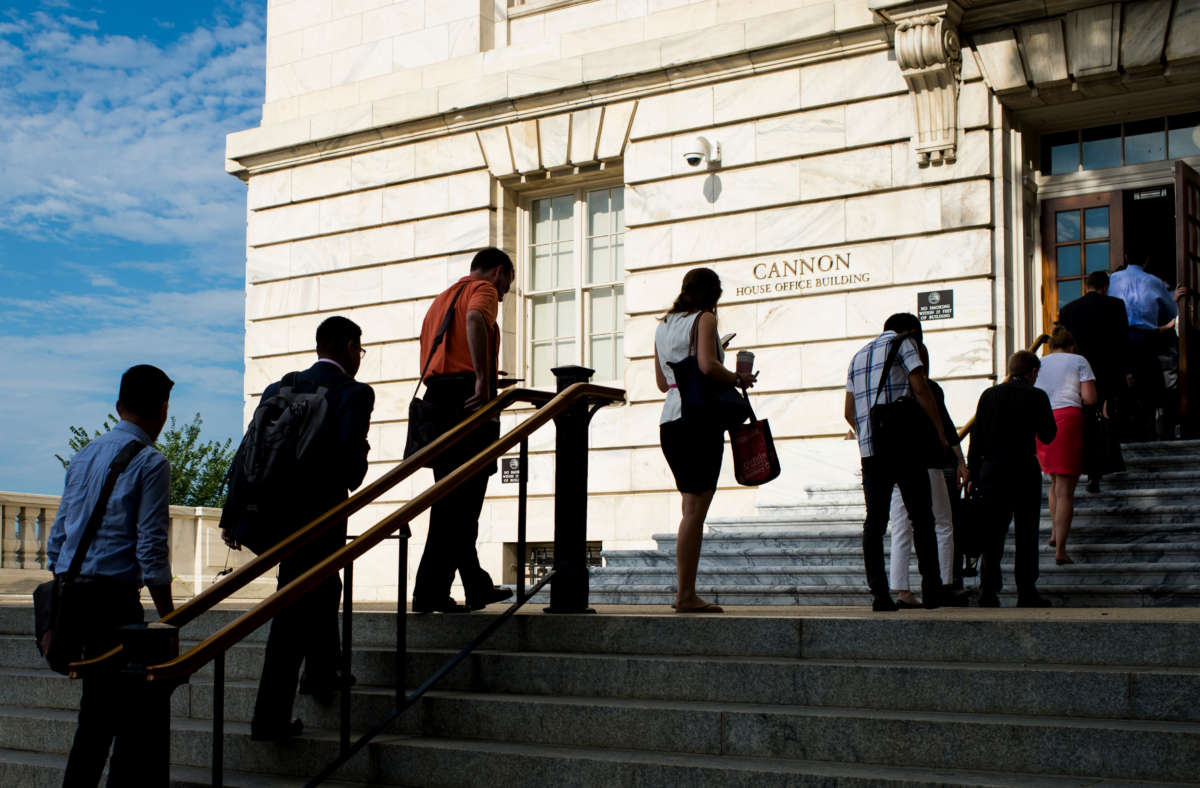Honest, paywall-free news is rare. Please support our boldly independent journalism with a donation of any size.
On Wednesday, organizing congressional workers sent a letter to House leaders urging them to bring a resolution that would greenlight their ability to unionize to a swift vote.
House Res. 915, which was filed by Rep. Andy Levin (D-Michigan) in early February, would activate existing policies that would allow congressional staffers to begin petitioning for and forming unions. In its letter, the Congressional Workers Union argues that there’s no reason to keep delaying action on the over two month-old resolution and that it must be brought to the floor.
“We, as congressional workers, fight every day for a better future for ourselves, our families, this institution, and the American people. However, we currently lack the basic protections and legal processes to organize enjoyed by other federal workers and workers across this country,” the group wrote. “Many of us write and work tirelessly to advance the very laws that protect and promote every worker’s right to organize. We deserve those same rights.”
The workers asked House Speaker Nancy Pelosi (D-California), Majority Leader Steny Hoyer (D-Maryland), and chairs of the House Education and Labor; Rules; and Administration committees to bring the resolution to a vote during the week of April 25, or in roughly two weeks.
It’s unclear why the resolution hasn’t yet been brought to a vote. Early last month, the House Administration Committee held a hearing on the subject to explore and finalize the resolution. Though the legislation allowing the union, the Congressional Accountability Act (CAA), was passed nearly three decades ago, lawmakers never took the last step to formally authorize workers to unionize.
The resolution would flip the switch on the legislation, and each Congress member’s office would qualify as a separate bargaining unit that could unionize.
“For 26 years, Congress has failed to act, and workers have suffered for it,” wrote the Congressional Workers Union. “As the leaders of this institution responsible for protecting American democracy, you now have an opportunity to fulfill the promises of the CAA by extending congressional workers these basic rights — protecting the freedom of association and fostering democracy in your own workplaces.”
House leaders appear to be in support of the effort. In February, a spokesperson for Pelosi said that she would offer her “full support” for unionization, while Administration Committee Chair Zoe Lofgren (D-California) has said that it is “well past time” for the resolution to be passed. President Joe Biden is also in favor of the push, according to White House Press Secretary Jen Psaki.
The resolution appears to have the support of much of the House Democratic caucus. When it was first introduced, it had 136 cosponsors; since then, it has picked up nearly 30 more.
Congressional workers have been in the midst of organizing for over a year, citing low wages and grueling working conditions. These conditions have led to a “brain drain” from Congress, they say, as well-qualified workers flee for better wages and conditions in the private sector.
Non-white staffers are treated especially poorly, they say. On the Dear White Staffers Instagram account, anonymous non-white staffers say that they feel like they have no room for advancement, they face racist harassment in the halls of Congress and that Capitol Hill staff are overwhelmingly white, despite increasing diversity in Congress.
Media that fights fascism
Truthout is funded almost entirely by readers — that’s why we can speak truth to power and cut against the mainstream narrative. But independent journalists at Truthout face mounting political repression under Trump.
We rely on your support to survive McCarthyist censorship. Please make a tax-deductible one-time or monthly donation.
